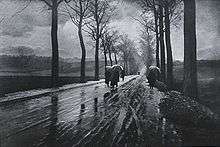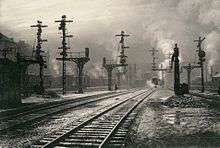Léonard Misonne
Léonard Misonne (1 July 1870 – 14 September 1943) was a Belgian pictorialist photographer. He is known for his landscapes and street scenes with atmospheric skies.
Léonard Misonne | |
|---|---|
 | |
| Born | 1 July 1870 |
| Died | 14 September 1943 (aged 73) |
| Known for | Photography |
| Movement | Pictorialism |
| Spouse(s) | Valentine Lambin (m. 1906) |
Early life
Born to a wealthy family in Gilly, Belgium in 1870, Léonard Misonne was one of many children of Adèle Pirmez and lawyer and industrialist Louis Misonne.[1][2] He studied Greek and humanities in Charleroi[3][1] before going to the Université catholique de Louvain where he got a degree in mining engineering.[4] However, he did not become a mining engineer in the long term.[3][5][lower-alpha 1]
Photography

Misonne is best known for his atmospheric photographs of landscapes and street scenes, with light as a key feature,[6] and as a pioneer of pictorialism.[5][7] According to the Directory of Belgian Photographers, "Misonne’s work is characterised by a masterly treatment of light and atmospheric conditions. His images express poetic qualities, but sometimes slip into an anecdotal sentimentality."[4] He was nicknamed "the Corot of photography".[8][9]
Misonne devoted himself to photography from 1896,[1] joining the Belgian Photography Association in 1897.[10][5] He became a leading light in pictorialism, frequently exhibiting his photographs at exhibitions.[4][3] He also did slide shows.[5] Much of his photography was in Belgium and the Netherlands,[8] but he also visited London, France, Germany and Switzerland. The German occupation of Belgium during World War II greatly restricted his photography.[5]
Techniques
Misonne would often photograph things that were strongly illuminated from behind, producing a halo effect.[10] He would also retouch the lighting effects in his photographs,[8] experimenting with and using many techniques, such as the Fresson process and later the bromoil and mediobrome processes.[9][11][11][4] He also invented the "flou-net" and "photo-dessin" processes.[7][10][3]
Personal life
Misonne married Louise Valentine Lambin in 1906, and they had several children.[15][lower-alpha 2] He supported himself with the family fortune.[7]
Misonne was a keen cyclist, winning some races.[7]
Misonne suffered severely from asthma throughout his life, and died in Gilly in 1943.[5][8]
Gallery
 By the mill, 1910s
By the mill, 1910s At sunset
At sunset Rainy day, 1930s
Rainy day, 1930s Exit from Namur station
Exit from Namur station.jpg) Waterloo Place, London, 1899
Waterloo Place, London, 1899 Tree in the mist, 1910s
Tree in the mist, 1910s Strolling with a parasol, 1910s
Strolling with a parasol, 1910s Rainy street with tram in Brussels, 1937
Rainy street with tram in Brussels, 1937
Notes
- Sources differ on whether he actually worked as a mining engineer at all
- Some sources spell his wife's name as Labin, but this article assumes that the spelling in the genealogy site is correct
References
- "Léonard Misonne: Belgian, 1870 - 1943". National Gallery of Art. Retrieved 30 October 2019.
- "Louis-Désiré Misonne: family tree". Marcel l'Hoost. Retrieved 30 October 2019.
- "Turn of the Century: London, 1899 By Léonard Misonne". Ridley McIntyre. Retrieved 30 October 2019.
- "Misonne, Léonard". Foto Museum. Retrieved 30 October 2019.
- "Léonard Misonne". Galerie Retelet. Retrieved 30 October 2019.
- "Léonard Misonne". ND Magazine. Retrieved 26 November 2019.
- "Matinee: Leonard Misonne". Mike Pasini. 2006-03-01. Retrieved 26 November 2019.
- "Leonard Misonne". pammyv02. Retrieved 30 October 2019.
- "Léonard Misonne". BKW Gallery, Brussels. Retrieved 26 November 2019.
- "Monday's photography inspiration – Leonard Misonne". pammyv02. Retrieved 30 October 2019.
- "Oil Prints and Bromoil" (PDF). Jacques Kevers. 2001. Retrieved 26 November 2019.
- "Max Dupain". National Gallery of Australia, Canberra. Retrieved 26 November 2019.
- "Léonard Misonne". Galerie Retelet. Retrieved 26 November 2019.
- "When Photos Looked Like Paintings: Dreamy Landscape Photographs Taken By Leonard Misonne". Dmitry. 2001-08-18. Retrieved 26 November 2019.
- "Leonard Misonne: family tree". Marcel l'Hoost. Retrieved 30 October 2019.
- "Tableaux photographiques / par Léonard Misonne". National Library of Australia. Retrieved 30 October 2019.